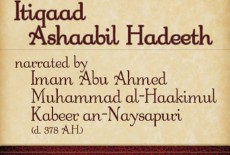Brief Discussion regarding the rulings of a Muslim prisoner
I was translating some parts for my other book : https://fahmalhadeeth.com/refuting-the-khariji-notion-on-alliance-with-the-kuffar/ and the below was skipped from it so i thought to publish this for the students interested in this subject.
Imam ibn Abi Zaid (d. 386 A.H) rahimahullah quoted Imam ibn Habeeb rahimahullah from his book saying :
قال: وإنما الرخصة فى القول والقلب مطمئن بإلايمان. وإما على أن يعمل عملاً فيسجد لغير الله أو يصلى إلى غير القبلة أو يشرب الخمر ويأكل الخنزير أو يزنى أو يقتل مسلماً أو يضربه أو يأكل ماله وما أشبه ذلك فلا رخصة له وإن خاف القتل.
“ Verily the concession (given under coercion) is in the (deceiving) speech provided that the heart is firm on Emaan. So if he is coerced into doing actions such as prostrating to other than Allah or praying towards other than the qiblah or drinking wine or eating pork or indulge In zinah or kill a Muslim or even beat him or confiscate his property then he has no concession to do these things even if he fears death. “
قال ابن عباس: التقية بالقول وليس بالفعل ولا باليد.
Ibn `Abbas (r.a) said :” deception (under coercion) is by speech and not with one’s actions or hands “
وقال محمد بن الحسن: إن كان الصنم إذا سجد إليه قبالة القبلة فله أن يسجد وينوى القبلة، وهو قول حسن.
Muhammad ibn Sahnoon (rahimahullah) said: “ If he is made to prostrate to an idol and if the idol is aligned with (or in the direction) of the qiblah then he prostrates with the intention of (prostrating towards) the qiblah. “ Imam ibn abi zaid said : “ and this is a good statement”
TN: As has preceded , doing sajdah to other than the direction of qiblah was not allowed by the scholars and the above fatwa also agrees to the same wherein the only exception of prostrating under coercion is allowed by one group of scholars is when it is in the direction of the qiblah so your heart’s intention is to face the qiblah even though your apparent action seemingly shows as if you are prostrating towards the idol which is placed in the direction of the qiblah.
ومن كتاب ابن سحنون قال الأوزاعى: أبيح للمكره القول ولا يصدق ذلك بعمل. قال: فإن أكره على ذلك مثل السجود للوثن أو صليب أو أكل خنزير وشرب خمر، فلا يفعل وليختر القتل، وقاله قتادة
Ibn Sahnoon in his book brings al-Awza`e who said : I deem it permissible to deceive via speech under coercion but it is not right to apply this concession on actions . So if he is coerced into that such as prostrating to something filthy (such as idol) or towards a cross or to eat pork or drinking wine then he should not partake in this and rather prefer being killed and Qatadah (rahimahullah) said this (as well).
. وقال سحنون: يسعه أن يفعل ذلك كما يسعه فى القول. وقال الحسن ومكحول: يكره على القول والعمل وهو يسر إلايمان.
“ Hasan and Makhool rahimahumallah said that it is makrooh to use this concession in statement and actions both because this is considered as an ease/diminishing in emaan. “
قال سحنون قال مالك والأوزاعى أخبره عنهما الوليد: قد أسر عبد الله ابن حذافة صأحب النبى صلى الله عليه وسلم، فطبق عليه فى بيت مع خمر وخنزير ليأكل من ذلك ويشرب، فآخرج بعد ثلاث ولم يفعل وكاد أن يهلك، فقال لصأحب قيسارية: إن الضرورة تبيح لى ذلك ولكن كرهت أن أشتمك بالإسلام.
“ Ibn Sahnoon said that al-Waleed informed him via al-Awza`ee and Malik that `Abdullah ibn hudahafa radhiallahu `anhu who was a companion of the Messenger of Allah (sallalahu `alayhi wa sallam) who was taken captive and tied in a place with pork and alcohol in order to have him eat and drink that. They removed him after three days and found that he (r.a) didn’t do either and was about to die. So he (r.a) said to the commander ( of قيسارية – a town in Palestine region of shaam),under duress it was permissible for me to do that (i.e. eat and drink to survive) but I hated that Islam be put down in front of you”
وروى الوليد عنهما فى أسير قدم للقتل بعد أن صلى العصر أيركع ركعتين؟ قإلا: ليركع فى كل وقت. وقال ابن نافع عن مالك قال ما سمعت ذلك. قال سحنون: لا يركع إلا فى وقت تصلى النافلة.
Imam sahnoon rahimahullah says that Waleed has narrated from them (Malik and al-Awza`ee) regarding a captive who was brought forth to be killed after he has prayed the `Asr prayer so can he pray two rak`ah (as his last wish)?. They said : He can pray in any time. Ibn Nafi` said he hasn’t heard this (fatwa) from Malik . Sahnoon (rahimahullah) said : He is not to pray except in the permissible times of praying voluntary prayers.
قال الأوزاعى وسحنون فى أسير موثوق منع من الصلاة، قإلا: يصلى إيماء.
Al-Awza`ee and Sahnoon said regarding a captive who was tied and forbidden from praying so they (rahimahumallah) said : He will pray via indication /gestures
قال سحنون: فإن أطلق فى الوقت أحببت له أن يعيد وما ذلك عليه. قإلا: فإن حيل بينه وبين الماء فليتيمم ويصلى. قال الأوزاعى: فإن حيل بينه وبين التيمم فلا يدعه وإن قتل، إلا أن يكون فى حديد ولا يقدر معه على وضوء ولا تيمم. قال سحنون: إذا خاف القتل وسعه ترك التيمم، وكذلك ترك الصلاة.
Sahnoon said : if the captive were to be released then and there then I love that he re-do his prayer and repeat whatever was wajib upon him during captivity.
Awza`e and Sahnoon both said : If there is a barrier between him and water then he is to do tayammum and pray.
Imam al-Awza`ee (rahimahullah) said : If there is a barrier between him and tayammum then he is to not leave out doing tayammum even if he was killed in doing so except if he was shackled with iron due to which he cannot do tayammum nor ablution with water.
Imam as-sahnoon rahimahullah said : If he fears being killed (while pursuing or insisting on doing tayammum) then he has the flexibility to leave the ablution and likewise prayer as well.
وروى معن عن مالك فيمن كعمه العدو ثم حلوه، أنه لا يعيد ما مضى وقته من الصلاة. وعلى رواية ابن القاسم فى الذين تحت الهدم: يعيدون أبداً. وابن نافع لا يرى على من تحت الهدم إعادةً.
Imam Ma`n reports from imam Malik (speaking) about one who was tied up by the enemies and then untied (later). So Imam (Malik) said that he will not repeat the prayer whose time has passed.
As per the narration of Ibn qasim (rahimahullah) regarding those people who are trapped under collision/collapse materials then they will repeat the prayer .
But Ibn Nafi` rahimahullah is of the opinion that those under collapse do not have to repeat the prayer (i.e. it is not wajib for them)
قال الأوزاعى: ليس على أسارى المسلمين جمعة. قال سحنون: ولو كانوا جماعة يكون لمثلهم جمعة ولم يمنهم من ذلك العدو فليجمعوا، كانوا فى سجن أو فى مدينة مسرحين.
Imam al-Awza`e said there is no Friday prayer (incumbent) upon a Muslim captive. Imam as-Sahnoon rahimahullah said : If they are of a group similar to those who have Jumu`ah and If the enemies aren’t stopping them from praying then they should pray Jumu`ah whether they are in captive or free residing in a city.
قال ابن شهاب ومالك والأوزاعى: إن الأسير يتم حتى يسافر. قال سحنون: ويسألهم عن المسافة ويقبل منهم.
Ibn Shihab, Malik and Awza`e say that a captive will not shorten the prayer but pray it fully until he is travelling. Whereas Sahnoon rahimahullah said that the captive will ask his captors regarding the travel (distance) and then accept it from them.
قال معن عن مالك: ولا بأس على المجاهد أن يصلى بالسيف قد قتل به المشرك ولا يغسله.
Ma`n rahimahullah said from Malik that he said : And it is alright if a Mujahid is to pray keeping his blood stained sword as sutrah with which he fought the mushrikeen.
قال الأوزاعى: وإذا دعى الطاغية من عنده من أسارى المسلمين أن يقاتلوا معه من خالفه من أهلملته ويخليهم إن فتح له، فإن قاتلوا معه لأنجاز ما وعدهم لا ليحظوا عنده أو ليعزوا دينه فلا بأس بذلك. فعله فروة بن مجاهد فى أصحاب
له من التابعين مع طاغيته الرومى غزوة برجان، ففتح لهم فأطلقهم، فلم ير من كان يومئذ من العلماء بذلك بأساً.
Awza`e said : And when an oppressive (Kafir) ruler (الطاغيةُ) calls on to his Muslim captives to aid and assist him in fighting against his opponents from his religion and if they do so he will free them and thus if they (captive Muslims) fight alongside him so as to achieve what he promised (i.e. setting them free) and not to win him over [1] nor fight with the intention to venerate his religion then there is no harm in that. And Farwa ibn Mujahid (rahimahullah) did likewise with his Taba`een companions when the oppressive roman ruler asked for his (and his companion’s) aid in the battle of Burjan and they were granted victory and the oppressive roman ruler freed them. So the scholars present that time (in that era) didn’t find an issue with such an action
[1] In this context the term ليحظوا implies trying to win him over so as to be on his good side and derive benefit from him , in other words there is a difference between aiding them for personal benefit such as being away from harm and a difference in doing more than what was asked/needed with the intention of being his faithful comrade/servant.
قال الأوزاعى: ويسعهم أن يقاتلوهم من غير دعوة إلى الإسلام، وما غنموا فهو له لأنهم كعبيده. قال سحنون: بقول مالك أقول: أنهم لا يقاتلون معه وإلى من يدعوهم.
Al-Awza`e said : And they have the flexibility to even kill them without calling them to Islam and whatever war-booty they get then it is for the tyrant ruler and not for the Muslims because (in this scenario) they are like his slaves.
Ibn Sahnoon said with the statement of Malik that they will neither fight allying with the tyrant ruler nor fight against those whom they wanted to call to Islam
قال ابن القاسم: وكذلك لو كان عنده تجار فأراد أن يقاتلوا معه فلا يفعلوا ولا يجوز لهم ذلك. وقال مالك فى الروم يقولون لأسارى مسلمين عندهم: قاتلوا معنا أعداءنا من الروم ونطلقكم، فلا يجوز هذا إلى من يردونهم.
And likewise Ibnul-Qasim rahimahullah said that if that tyrant ruler had (in captivity) Muslim business men and he wants them to fight with him then they should not do it and neither is it permissible for them to aid him in that.
And Imam Malik rahimahullah said regarding romans who said to their Muslim captives “ fight with us against our roman enemies and we will free you all” So it is not permissible for them (Muslims) to respond to this .
من العتبية: قال يحيى بن يحيى عن ابن القاسم فى أهلبرشلونة حين أجل لهم العدو سنةً لرحلتهم، فتخلف بعد إلاجل من المسلمين من أغار على المسلمين وأخاف وسبى وقتل أو لم يقتل، قال: هو كالمحارب إن أصابه الإمام رأى كالمحارب ولا قتل عليه ولا عقوبة إذا تبين أنه يخاف وأنه مأمور.
`Utaybah said that Yahya ibn Yahya narrated from ibn qasim regarding the people of Barcelona where the enemy was given them a time frame of one year to leave the place but after this some Muslims were left behind who attacked and threated Muslims and killed (some and) spared some so Ibn Qasim said : such a Muslim is like Harbi whom if the Imam (khalifa/ruler) catches then he treats him as a harbi but does not kill him nor punish him if it is proven that he did what he did out of fear and under command (of the enemies).
ومن كتاب ابن سحنون: قال قتادة فى امرأة سبيت فخافت الفضيحة: أتقتل نفسها؟ قال: لا ولتصبر. قال الأوزاعى: ولا تؤتى إلا عن ضرب. قال سحنون: إنما عليها أن لا تؤتى طائعة، فإن أكرهت وسعها. وإذا خافت القتل أو ضربت وسعها. وكذلك المطلقة ثلاثاً يطأها زوجها فليس عليها قتلها ولا قتله ولكن لا يأتيها إلا مكرهة.
And ibn sahnoon in his book brings the statement of Qatadah regarding a woman captive who fears for her life so can she kill her own self? Qatadah (rahimahullah) said “no but she should be patient. “ Al-Awza`ee said she cannot do this except she is beaten (to death) ”
Sahnoon (rahimahullah) said : She cannot do this willingly but if she is coerced to kill herself then it is possible . And if she fears being killed or is beaten (to death) then it is permissible. And likewise is the case of a woman divorced (irrevocably) by three (divorces) and her husband still has intercourse with her then she cannot kill herself nor her husband except if she is coerced or helpless (i.e. raped)
قال الأوزاعى فىالأسير يأمره سيده أن يسقيه الخمر قال: لا يفعل وإن قتل. قال سحنون: بل يسقيه إن خاف القتل أو قطع جارحة له. قيل: فأى ذلك أفضل؟ قال: يسقيه إن خاف القتل أو خاف ضرباً يخشى منه الموت وإلا فلا، ثم رجع فقال مثل قول الأوزاعى.
Awza`ee (rahimahullah) said: regarding a captive whose captor forces him to drink wine so he should not drink and rather be killed. Sahnoon says : But if he fears death or fears having his limbs or body parts being ripped then he can drink. It was said to him “what is best among these two (fatawa)?” He (rahimahullah ) replied: “ If he fears death or fears being beaten to death then he can drink otherwise no (and he is to resist as much as he can)”. But later he retracted from his statement later on and said what Imam al-Awza`ee said .
قال الأوزاعى: وإن أمره الطاغية بقتل العلج فليفعل. قال سحنون: كل من للأسير قتله إن جفى له فليطعه فى قتله ولا يطيعه فى من ليس له قتله إن جفى له، مثل أن يطلق ويؤتمن فلا يسعه ذلك. وإما الذى فى وثاق أو سجن فله ذلك بأمره أو بغير أمره. ولو كان مطلقاً وأخذ الطاغية عدواً له من البرجان فله قتلهم بأمره لأنهم عدو لم يأتمنوه على شىء. وإن أمر بقتل أسير مسلم فلا يفعل وإن خاف القتل. فإن قتله قتل به إن طفر به.
Al-Awza`ee said : If the tyrant captor asks the Muslims to fight non-Muslims along with him then they can do it. Sahnoon (rahimahullah) said : Whoever is permissible for the captive to kill and is coerced to kill that person then he may obey (aid) the tyrant ruler in this. But he cannot obey/aid the tyrant ruler in killing someone whom it is not permissible for him to kill, even if they coerce him. For example if they promise to free him or consider him to be reliable , still it wouldn’t be permissible for him. However it is different if a person was chained or imprisoned to do so with or without the command. And if he were to be free and the tyrant ruler captured his own enemy from Barjan then it is permissible for him (the Muslim) to kill them (the enemies caught by the ruler) on his (tyrant ruler’s) command because they (the Non Muslims captured from barjan) are his (the Muslim’s) enemies (too) and the tyrant ruler did not consider the Muslim captive as Ameen (trustworthy, reliable) in this scenario [1] and if he were commanded to kill another Muslim captive then he should not do this even if he feared death. And if he kills another Muslim captive then he too shall be killed when found (by the Muslim authorities)
[1] Tn: because the Muslim captive is not killing the captives of Barjan to please the tyrant ruler but rather because these captives are enemies to both the tyrant ruler as well as the Muslims themselves
قال الأوزاعى: وإن أخذ مال أسارى مسلمين فأعطاه إياه كرهت له أخذه. قال سحنون: حرأم عليه أخذه، قال: وإذا رأودته امرأة سيده أن يطأها فإن لم يفعل كذبت (عليه أنه رأودها فخاف على نفسه، فلا يسعه وطأها بهذا. وإن أكرهه الطاغية على أن يزنى بمسلمة) أو حربية وإلا قتله أو قطع جارحة له فلا يفعل.
And if the tyrant ruler were to snatch the wealth/property of other Muslims and give it to one Muslim captive (so as to express thanks /bribe / etc.) then I hate it for him to accept it. Sahnoon (rahimahullah) said : Taking that property (of other Muslim captives) is haram upon him. If the wife of his chief (i.e. master/employer/etc. ) coerces him into having relations with her then he should not do so. And (the situation were such that) if he were to refuse then the woman would falsely accuse him of luring her and in such a situation he (Muslim captive) fears being put to death (by her husband ) then he should still not give in based on this. And if the tyrant coerces him into fornicating with a Muslimah or with a harbi female or else he would be killed or his body part would be cut, still he shouldn’t do it.
قال سحنون: وللأسير أن يخيط عندهم ويعمل من الصنائع مالا يضر بالإسلام، ولا يصقل سيفاً أو يعمل سلاحاً إلا أن يخاف القتل أو الضرب فليفعل. وله أن يشترى منهم المضحف ويحتال آخراجه من بلدهم، وأكره أن يأخذ منهم قراضاً، وإنما لم أكره أن يخيط لهم ويعمل لضرورته، ولا يعمل لهم سلاحاً قد علم أنهم لا يقاتلون به الإسلام وإنما يقاتلون به البرجان.
قال سحنون: وللأسير أن يحرم بالحج وأن علم أنهم لا يخلونه. وقد أحرم البنى صلى الله عليه وسلم، وهو يعلم أنه يصد.
Imam sahnoon rahimahullah said : And it is permissible for the (muslim) captive to stitch some things (for them) which would not bring harm to Islam (or Muslims). Nor should he shine (repair) any sword or weapons (of the enemies) except if he fears being put to death then it is permissible. And it is permissible for him to buy things from them and device a way or means to escape their lands and I hate that he take loans from them but I do not detest him stitching for them or doing something so as to fulfil what is his need. But he should not make for them weapons which he knows that they will not use this against Muslims but rather they will use it to fight against Non Muslims of Burjan .
Sahnoon said : And it is permissible for the captive to wear Ihram for Hajj even if he knew that they would not permit him because the Prophet sallalahu `alayhi wa sallam tied his Ihram even though he knew he would be stopped (by the quraish).
[Ref: From the maliki book of ibn abi zaid (D. 386 A.H) – An-Nawadir waz-ziyadat (النَّوادر والزِّيادات ) 3/312-315; Shamela]
Also see the rights of Non Muslim prisoners of wars in Islam : http://the-finalrevelation.blogspot.com/2012/09/the-rights-of-prisoners-of-wars-in-islam.html







